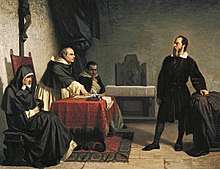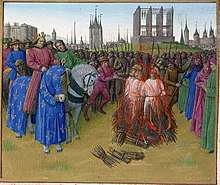The Inquisition started in 12th-century France to combat religious dissent. It was a type of government institution within the Catholic Church whose stated goal was to eliminate heresy. Inquisitors were generally chosen from members of the Dominican Order, replacing the earlier practice of using local clergy as judges. During the Late Middle Ages and the early Renaissance, the concept and scope of the Inquisition significantly expanded. With the exception of the Papal States, the institution of the Inquisition was abolished in the early 19th century, after the Napoleonic Wars in Europe and the Spanish American wars of independence in the Americas.

Galileo was condemned by the Roman Catholic Inquisition in 1633 for his support of heliocentrism.

The persecution of the miserable witches and sorcerers, the mediums and the obsessed, was a mere screen. The Inquisition was created to establish unrestrained rule over the poor, frightened population. The most effective means of achieving this was robbery and the annihilation of all those who aspired to bring light into the darkness of the Middle Ages—those who were too independent, who dared to talk about the General Good, who protested against this kingdom of the devil, personified in the representatives of the Inquisition. The establishment of the Inquisition was a horrible caricature of Divine Justice. ~Helena Roerich
Quotes
- In antiquity, when communicating the commandments of God it was customary to cover the face. Later, people tried to overcome matter by proclamation of powers they had not yet mastered. Of course, this gave birth to the Inquisition. The essence of the Inquisition was persecution of the unusual.
- Agni Yoga, Leaves of Morya’s Garden II, p. 169, (1925)
- Two signs of the authenticity of the Teaching are: first, striving for the Common Weal; second, acceptance of all previous Teachings which are congruous with the first sign. It must be noted that the primary form of a Teaching does not contain negative postulates. But superstitious followers begin to fence in the Covenants with negations, obstructing the good. There results the ruinous formula: “Our creed is the best,” or, “We are the true believers; all others are infidels.” From this point it is a single step to the Crusades, to the Inquisition, and to seas of blood in the name of Those Who condemned killing. There is no worse occupation than forcible imposition of one’s creed.
- Agni Yoga, Leaves of Morya’s Garden II p. 334, (1925)
- Today, we experience a dreadful spiritual crisis, a terrible, all-corrupting atheism, which results from narrow, lifeless sectarianism and from choking dogmatism, as well as from the fall of morality among the representatives of churches. We have never spoken, nor will we speak against any religion or church, as it is better to have some religion or church than none at all. But we will always protest against lack of tolerance, morality and knowledge. Priests are necessary, but they should be real spiritual leaders and should be progressive and not continue to exist in the chains of the dark ignorance of the Middle Ages. The spirit of the Inquisition is still very strong. Do you think that if Christ came again on earth now He could avoid crucifixion? At best, would He escape lynching, or imprisonment for life, with the title of Antichrist?
- Helena Roerich, Letters I, (11 August 1934)
- I cannot agree with your statement: "The merit of the Inquisition was that by burning about ten million witches and sorcerers it prevented the masses from participating in black magic and nocturnal orgies dedicated to Satan," etc. Indeed not! By killing millions of its victims the Inquisition created a most dreadful evil obsession... No, the Inquisition was established not just for the persecution of pitiful witches and sorcerers (mostly mediums), but for the annihilation of all the differently minded people, and all personal enemies of the representatives of the church, the latter having decided to obtain absolute power. First of all, among the so-called enemies of the church were the most enlightened minds, those who were working for the General Welfare, and the true followers of the Testaments of Christ. Indeed, the easiest way to destroy the enemy was by accusing him of being in league with the devil.
- Helena Roerich, Letters I, (8 September 1934)
- The persecution of the miserable witches and sorcerers, the mediums and the obsessed, was a mere screen. The Inquisition was created to establish unrestrained rule over the poor, frightened population. The most effective means of achieving this was robbery and the annihilation of all those who aspired to bring light into the darkness of the Middle Ages—those who were too independent, who dared to talk about the General Good, who protested against this kingdom of the devil, personified in the representatives of the Inquisition. The establishment of the Inquisition was a horrible caricature of Divine Justice.
- Helena Roerich, Letters I, (8 September 1934)
- Thus, we should find that the law of Reincarnation was rejected by the Council of Constantinople in the sixth century A.D., in spite of the fact that the Gospel itself contains words of Christ that have obvious reference to the law of Reincarnation. If people would take the trouble to study seriously the fundamental Teaching of Christ, and if possible in the original language of the Gospels instead of being satisfied with the school textbooks, they would discover a new meaning in the words, and the true, great Image of Christ would be revealed to their spiritual sight. Long ago it was said by all the Great Teachers that ignorance is the worst crime. And so it really is. What if not the darkness of ignorance bred the Inquisition? The Inquisition is the most frightful, ineradicable stain on the golden vestments of the Christian Church.
- Helena Roerich, Letters I, (12 September 1934)
- Let us think of all those great ones who suffered under the Inquisition, or who had to conceal their luminous knowledge under the mask of folly or under the most complicated symbols, the key to which—unfortunately for humanity—is almost lost. Let us remember also about those numerous great books, full of light and goodness, the loss of which is irreparable and was considered by the best minds of all later epochs as the greatest misfortune. It is an accepted thing to be indignant about the burning of the Alexandrian Library, but many hypocrites will prefer to be silent about the string of fires lit by the Inquisition which through centuries steadily consumed at the stake the pearls of human genius!... Believe me, the spirit of the Inquisition is still strong. If Christ appeared on Earth today, possibly he would escape crucifixion and the stake, but He would hardly escape severe life imprisonment, with the stamp of Antichrist upon Him. I suggest that you reread Dostoevsky's "The Grand Inquisitor."
- Helena Roerich, Letters I, (12 September 1934)
- The following extract is a cutting satire on modern theology generally and the Roman Catholic religion in particular. The idea is that Christ revisits earth, coming to Spain at the period of the Inquisition, and is at once arrested as a heretic by the Grand Inquisitor.
- Theosophist, Nov., 1881

He comes silently and unannounced; yet all--how strange--yea, all recognize Him, at once! ...The Sun of Love burns in His heart, and warm rays of Light, Wisdom and Power beam forth from His eyes, and pour down their waves upon the swarming multitudes of the rabble assembled around, making their hearts vibrate with returning love. ~Feodor Dostoevsky
.jpg)
Everything was given over by Thee to the Pope, and everything now rests with him alone; Thou hast no business to return and thus hinder us in our work.' ~Feodor Dostoevsky
The Grand Inquisitor by Feodor Dostoevsky (1879–1880)
Full text online (Translation by H.P. Blavatsky)
- He comes silently and unannounced; yet all--how strange--yea, all recognize Him, at once! The population rushes towards Him as if propelled by some irresistible force; it surrounds, throngs, and presses around, it follows Him.... Silently, and with a smile of boundless compassion upon His lips, He crosses the dense crowd, and moves softly on. The Sun of Love burns in His heart, and warm rays of Light, Wisdom and Power beam forth from His eyes, and pour down their waves upon the swarming multitudes of the rabble assembled around, making their hearts vibrate with returning love.
- He pauses at the portal of the old cathedral, just as a wee white coffin is carried in, with tears and great lamentations. The lid is off, and in the coffin lies the body of a fair-child, seven years old... 'He will raise the child to life!' confidently shouts the crowd to the weeping mother. The officiating priest... looks perplexed, and frowns... The procession halts, and the little coffin is gently lowered at his feet. Divine compassion beams forth from His eyes, and as He looks at the child, His lips are heard to whisper once more, 'Talitha Cumi'--and 'straightway the damsel arose.' The child rises in her coffin...and, looking round with large astonished eyes she smiles sweetly...
- A terrible commotion rages among them, the populace shouts and loudly weeps, when suddenly, before the cathedral door, appears the Cardinal Grand Inquisitor himself... He pauses before the crowd and observes. He has seen all. He has witnessed the placing of the little coffin at His feet, the calling back to life. And now, his dark, grim face has grown still darker; his bushy grey eyebrows nearly meet, and his sunken eye flashes with sinister light. Slowly raising his finger, he commands his minions to arrest Him...
- The Grand Inquisitor...addresses Him in these words: "'It is Thou! ... Thou!' ... Receiving no reply, he rapidly continues: 'Nay, answer not; be silent! ... And what couldst Thou say? ... I know but too well Thy answer.... Besides, Thou hast no right to add one syllable to that which was already uttered by Thee before.... Why shouldst Thou now return, to impede us in our work?... But art Thou as well aware of what awaits Thee in the morning?...to-morrow I will condemn and burn Thee on the stake, as the most wicked of all the heretics...
- ...his words mean, in short: 'Everything was given over by Thee to the Pope, and everything now rests with him alone; Thou hast no business to return and thus hinder us in our work.' In this sense the Jesuits not only talk but write likewise.
- He [the Grand Inquisitor] seriously regards it as a great service done by himself, his brother monks and Jesuits, to humanity, to have conquered and subjected unto their authority that freedom, and boasts that it was done but for the good of the world... Man is born a rebel, and can rebels be ever happy?...
- Having disburdened his heart, the Inquisitor waits for some time to hear his prisoner speak in His turn... The old man longs to hear His voice, to hear Him reply; better words of bitterness and scorn than His silence. Suddenly He rises; slowly and silently approaching the Inquisitor, He bends towards him and softly kisses the bloodless, four-score and-ten-year-old lips. That is all the answer.
See Also
External links
This article is issued from
Wikiquote.
The text is licensed under Creative
Commons - Attribution - Sharealike.
Additional terms may apply for the media files.